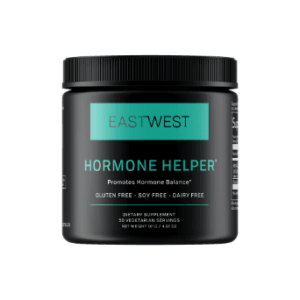As women we’re used to managing our monthly cycles – but misunderstanding and lack of information is still an issue when it comes to women’s health and in particular, the ways in which our hormones influence our daily lives and wellness.
There are many different hormones tied to a multitude of processes within the body acting at any given time – we tend to think of the reproductive hormones first and foremost, but there are many more we need to be aware of to develop a full picture of optimal health. Although we often focus on the troublesome aspect of hormones when things go wrong, understanding and naturally balancing hormones can have plenty of positive effects on our lives.
Although hormonal imbalance is quite common, it isn’t always normal and can be linked to a variety of conditions including Polycystic Ovary Syndrome (PCOS) and Endometriosis.
Knowing some of the lesser-known symptoms of hormonal imbalance can help you to identify where there may be underlying issues, and to get help where needed.
 Why is hormonal imbalance so common?
Why is hormonal imbalance so common?
As women we naturally experience fluctuations in our hormone levels throughout our lives. What is ‘normal’ tends to look different at every stage from first menstruation to menopause – so understanding what should be happening at each step of the way (and knowing when we might need help) is essential.
Some natural influences on our hormone levels include:
Pregnancy: During and post-pregnancy hormone levels can be severely impacted, taking some time to return to their normal rhythm.
Menopause: During the menopause hormone levels change rapidly as the body produces less estrogen, causing an imbalance in hormone levels and resulting symptoms.
Hormonal contraception: Coming off hormonal contraception can cause hormone levels to become unbalanced as normal rhythm is restored. Sometimes these effects can cause long-term imbalances.
There are also some external, environmental factors that can affect our natural balance of hormones. These include:
EDCs: Endocrine Disrupting Chemicals (or EDCs for short) are found in many aspects of modern-day life – including plastic bottles, food containers and packaging, and beauty and cleaning products. These chemicals interact with our natural hormones, often mimicking them synthetically resulting in symptoms of an imbalance.
Diet: What we eat can influence our hormone levels in a positive or negative way. A diet heavy in processed meats and dairy can cause disrupted hormone levels.
Lifestyle changes: Smoking, excessive alcohol consumption and drug abuse can all influence hormone regulation and endocrine function.
Stress: Stress can upset the delicate balance of hormones, causing missed periods or spotting and exacerbating existing symptoms of hormonal imbalance.
Sometimes hormonal imbalance is not caused by lifestyle or natural changes – instead it can be linked to conditions such as PCOS and Endometriosis. It’s important to always discuss any changes you notice with your doctor and check your hormone levels, to determine the root cause behind any symptoms you may be experiencing.
Symptoms of hormonal imbalance
When we think of hormonal imbalance, we often tend to associate with symptoms like painful periods. Although this is often the case, there are many symptoms that are less obvious or lesser known that can how us in a subtle way that something is ‘off’ with our hormone levels.
1. Migraines and headaches – If you’re regularly getting headaches and migraines, enough to notice a pattern, it could be possible to link the symptoms with other signs of imbalanced hormones, such as bloating, mood swings or spotting in between periods. Start by taking a note of when the symptoms occur, and tracking them alongside your cycle. There are plenty of cycle related tracking apps available. This is valuable information you can take to your doctor to help them understand whether your hormones and symptoms may be linked.
2. Irritability and anxiety – Anxiety affects many American women – with numbers rising year over year. Many cases of anxiety reflect our busy lifestyles and the pressures of modern life coupled with the prevalence of overstimulating technology and always being available – but anxiety and mood changes can also be caused or exacerbated by hormonal imbalance. Natural, slight changes in mood around menstruation are quite common – but if your mood swings are intense and occur sporadically or interfere with your ability to maintain regular activities throughout each month, talk to your physician about having your hormone levels checked as there may be underlying issues that might be causing them.
3. Unusual weight gain or weight loss – When you are experiencing weight gain or weight loss but haven’t made any conscious lifestyle changes, often it’s a sign of your body trying to tell you something is off. If you feel you’re eating a healthy diet and haven’t made changes to your exercise regime, hormonal changes could be behind your weight changes. Hormone-related weight issues tend to affect the mid-section, so if you’re noticing fat deposits in this area, or are losing weight and aren’t sure why, get checked out ASAP by your provider.
4. Joint pain – Aches and pains can affect us more as we get older, but feeling pain in the bones and joints isn’t normal and can signal some hormonal fluctuations within the body, especially at certain times of the month. Like others, this symptom can arise due to certain deficiencies and underlying medical conditions, or an injury in a particular area if the pain is localized – so speaking to your doctor is key.
5. Tiredness and fatigue – Many women report feeling tired all the time – and although fatigue can be linked to deficiencies and certain medical conditions (as well as the stresses and strains of a hectic lifestyle) it can also be a result of hormone imbalance. If you feel tired even when you’ve had plenty of rest, or feel exhausted as soon as you wake up, these are both signs you need to get bloodwork checked by a physician to discover why your energy levels are so depleted.
Getting back into balance
Restoring hormonal balance is an individual process – what works for some women won’t work as well for others as we are all unique. There are some rules of thumb that can be beneficial for all women looking to restore hormonal balance from within, including:
*Taking care of your liver: Our liver is responsible for processing toxins and waste products – some environmental, others naturally occurring within the body. Without a well-functioning liver the body can’t process excess hormones in the body, causing them to build up over time. Liver health is tied to eating plenty of leafy greens, especially herbs, regularly detoxing, staying hydrated (more on this below) and avoiding toxins such as refined sugar, alcohol and chemicals in food and beauty products.
 *Staying hydrated: Drinking plenty of filtered water and herbal teas, avoiding diuretics like caffeine, is key to helping rebalance hormones.
*Staying hydrated: Drinking plenty of filtered water and herbal teas, avoiding diuretics like caffeine, is key to helping rebalance hormones.
*Supplements: If you need a little extra support, using herbs and supplements such as maca, magnesium and chasteberry can help to reduce excess hormones and restore normal endocrine function.
Our Hormone Helper blend has been specially designed to help rebalance and restore normal endocrine systems naturally, featuring maca, myoinositol and choline for healthier hormone function. Always consult your doctor before introducing any new medications or supplements.






